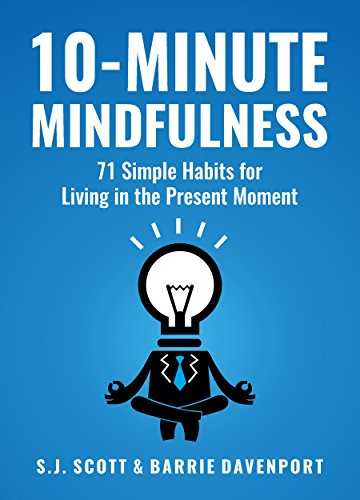10-Minute Mindfulness: 71 Habits for Living in the Present Moment
by: S.J. Scott, Barrie Davenport
Check out the book on Amazon | your public library.
25 Highlights | 2 Notes
Mindfulness is very simple. It means you become intentionally aware of the present moment while paying close attention to your feelings, thoughts, and sensations of the body.
But mindfulness involves one further step—the practice of non-judgment.
Then begin by writing down everything you want to accomplish for the entire week. Conduct a brain dump of every possible goal you can think of. You may have a list of twenty to thirty action items (or more). You can use this master list throughout the week (adding to it if necessary) to choose your daily goals. Review the list to determine
The simple act of visualizing, which requires mindfulness, focus, and creativity, frees the mind from mental chatter and negativity.
#27. Practice Transition Breathing If you’ve made it through your morning commute to your destination, whether it’s to work or some other task or meeting, you need a transition to ease you into the day and the work you have before you.
#36. Practice “Slow Work” A critical part of being present in the
#38. Cultivate a Beginner’s Mind Says Zen monk, author, and teacher Shunryu
A beginner’s mind is a concept in Zen Buddhism known as shoshin.
What does it mean to cultivate a beginner’s mind? It means you develop a willingness to release preconceived notions about the way things should be based on your existing knowledge or beliefs. In your work (and in life),
With a beginner’s mind-set, you temporarily suspend all of your opinions, knowledge, and strongly held beliefs so that you can explore an
idea without mental limitations.
Action Plan: When you approach a new project or task during your day, take a few deep breaths before you begin. Then visualize your mind as a blank slate with all your previous knowledge and experience erased. Ask yourself the question, “How can I approach this project differently?” Rather than immediately returning to standard operating procedures, allow your mind the time to brainstorm new options.
Let go of common sense for the moment, and step out of your comfort zone to give yourself the freedom to explore even the wildest possibilities. Sometimes these out-of-the-box, unexpected ideas turn out to be the most creative solutions.
As you are practicing a beginner’s mind-set, try to let go of the fear of failure. Suspend it for just a few minutes, and assume that success is the only possible outcome.
Learn More: Check out this podcast called “The Beginner’s Mind: Why Naiveté Is a Critical Business Asset.” Also read the book Zen Mind, Beginner’s Mind by Shunryu Suzuki.
Says coach and writer Kate Swoboda in an article for the blog Tiny Buddha, “Taking a digital break is about being willing to surrender, to let go completely, and to trust that when you return, it’s all going to be okay.” In fact, mindfully stepping
Action Plan: Try to take two or three mini-digital breaks during your workday for about ten minutes each. Start with just one if that’s all you feel comfortable doing. Close down your computer and turn off your phone. Set a timer for ten minutes. And use this time to break mindfully in a way that contributes to a calm but engaged state of mind.
Go outside and take a walk. Do your stand-and-stretch exercises. Outline a project
#44. Practice Strategic Acceptance
Getting outside feedback and advice can be helpful, but the best place to begin looking for solutions is within yourself. You need to be your own coach or advisor, tapping into your inner wisdom and intuition to lead you to the best course of action.
As author and Buddhist teacher Jack Kornfield says, “Let yourself walk with a sense of ease and dignity. Relax and let your walking be easy and natural, as if you were a king or queen out for a royal stroll.”
Begin walking forward slowly, one foot in front of the other. Pay attention to lifting each foot and placing it on the ground. Notice how your heel hits the ground before your toes. Notice how the ground feels beneath your foot.
At the end of the day, when the house is quiet and you’ve finished all your tasks, sit down for a few minutes of self-reflection. Find a quiet place where you won’t be interrupted or distracted. Close your eyes and go through a short breathing exercise to calm and clear your mind.
